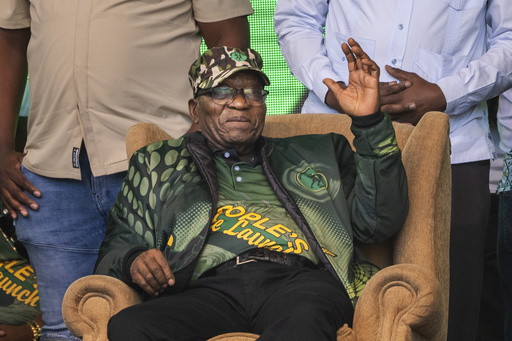CAPE TOWN, South Africa (AP) — Former South African President Jacob Zuma was disqualified Monday from running for a seat in Parliament in a national election next week because of a previous criminal conviction. The decision by the country’s highest court is bound to raise political tensions ahead of what might be a pivotal vote for Africa’s most advanced economy.
The Constitutional Court said that a section of the constitution disqualifying people from standing for Parliament if they’ve been sentenced to more than 12 months in prison without the option of a fine does apply to the 82-year-old former leader. Zuma was sentenced to 15 months in prison in 2021 by the Constitutional Court for contempt for refusing to testify at a judicial inquiry into government corruption.
Zuma cannot serve as a lawmaker until five years after that criminal sentence was completed, the Johannesburg-based Constitutional Court said. The ruling came nine days ahead of the May 29 election.
Zuma once led South Africa’s ruling African National Congress party but was forced out as its leader in 2017 and resigned as president in 2018 under a cloud of corruption allegations.
He returned to politics late last year with a new party and renewed his fierce criticism of the ANC and current President Cyril Ramaphosa, the man who replaced him as both party leader and the country’s president.
“This is the highest court in the land and we can’t challenge this decision,” said Sihle Ngubane, secretary-general of Zuma’s new MK Party. “But we’ll make our decision as an executive what to do from here onwards, dictated by Jacob Zuma.”
There was no immediate reaction from Zuma.
Next week’s election could be South Africa’s most important for 30 years, with the beleaguered ANC facing the biggest challenge to its long rule since the end of apartheid in 1994.
The ANC is struggling to hold onto its parliamentary majority and the election might force the country into a national coalition government. That would be its biggest political shift since the apartheid system of white minority rule was dismantled with the first all-race elections.
Zuma’s new party, called uMkhonto weSizwe (Spear of the Nation), or the MK Party, is the newest threat to the ANC. The Constitutional Court ruling doesn’t prevent the party from contesting the election but stops Zuma serving as one of its lawmakers.
MK launched its manifesto at a soccer stadium on Saturday, with Zuma at the center of the rally. Zuma appears on its election posters and is the face of its campaign.
South Africa’s independent electoral commission that governs its elections said Zuma’s image could remain on the party’s election regalia, but his name would be removed from its list of proposed candidates. Parties had to submit a list of their candidates for Parliament before the election.
South Africans don’t vote directly for their president, but rather for parties. Those parties then get seats in Parliament according to their share of the vote. The president is elected by lawmakers, meaning the party that holds the majority chooses the president. That has always been the ANC since 1994, but if it receives less than 50% of the vote this time, it will need a coalition to form a government and reelect Ramaphosa for a second and final term.
While Zuma’s MK Party is not expected to overtake the ANC, it could erode more of its vote and make it harder for the ruling party to retain its majority.
Zuma still enjoys significant support and the latest ruling by the Constitutional Court also increases the political temperature after some MK Party officials had suggested they would reject any decision stopping Zuma from being a candidate.
South Africa has had credible, peaceful elections since it became a democracy in 1994.
The case over whether his criminal sentence disqualified Zuma from the election came about because there was no option available to him to appeal the ruling by the apex court that sent him to prison in 2021. That raised questions if it counted as a conventional criminal sentence.
He was initially disqualified from running for Parliament by the electoral commission. He successfully challenged that decision at the Electoral Court. Monday’s ruling overturned that and confirmed his disqualification.
Zuma was South Africa’s leader for nearly a decade from 2009-2018, but stepped down under internal pressure from the ANC as allegations emerged of widespread government graft during his administration. He was later called to testify at a judge-led inquiry into those graft allegations, but refused. That led to his sentence for contempt.
The contempt sentence also reinforced Zuma’s lingering influence in parts of South Africa when it sparked a week of looting and rioting in two provinces that led to the deaths of more than 350 people, some of the country’s worst violence since the troublesome last days of apartheid. Zuma was released on medical parole after serving two months of the 15-month sentence.
Zuma has also been charged with corruption in a separate case that deals with allegations against him from a time before he was president. He is expected to go on trial next April on those charges and has pleaded not guilty.
___
AP video journalist Sebabatso Mosamo in Johannesburg contributed to this report.
—-
AP Africa news: https://apnews.com/hub/africa
Source: post





